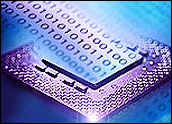
It used to be that every few years, the business media would report on the latest “slump” in sales of flash memory semiconductors. This was a decades-long trend — demand would “hot up,” as the Brits say, when new PC sales soared, and drop as they dropped.
The chipmakers’ fortunes no longer parallel those of the PC industry, however. Portable music players, most especially the iPod, are driving demand for flash memory computer chips. This is giving the flash memory industry a sales stability it has never had before.
Upward Trend
According to a report entitled “New iPods Will Spur 2H06 Recovery in NAND Flash” from research consultancy Gartner, strong growth in the portable media player market is expected in 2006, as the market is forecast to reach 187.7 million units, up from 134.5 million units in 2005.
The demand for portable media players such as Apple’s iPod, is the primary driver of sales of NAND flash memory. NAND flash-based players accounted for 80 percent of the market in 2005. So-called hard disk drive (HDD)-based portable music players make up the remaining 20 percent of the market.
“We expect Apple to introduce a new, high-end NAND flash-based iPod by the fourth quarter of 2006, and this player will most likely have 10GB to 12GB of storage capacity,” said Jon Erensen, a research analyst for Gartner. “The impact of an iPod with this storage capacity will have significant implications for the NAND flash market.”
Last fall, Apple introduced the 4 GB iPod nano priced at US$249 and the 1 GB iPod shuffle in January 2005 at $149. At the time, these NAND flash-based players represented the most aggressive pricing found in the portable media player market.
Apple Capacity
“Both of these introductions had a significant impact on the market, with competing vendors reacting by lowering prices and increasing capacities,” said Erensen. “Apple accelerated the highest available capacity [and] average capacity, and lowered the cost per MB for NAND flash players with the shuffle and the nano. We anticipate a similar course of events in the second half of 2006.”
Though demand has not dropped for flash memories, prices have. The present environment for NAND flash-based players experienced a decline in the first quarter of 2006, falling by 25 percent on average. Pricing was soft in the second quarter, but firmed up in the second half of the year.
Erensen forecasts that a 16GB memory chip will be available in the third quarter for about $30, down from its current price of about $35. Apple’s procurement power and investment totals are substation, so it is conceivable that it could get pricing for a device at $25 or even $20, he added.
This pricing would enable capacities of 12 GB, leaving enough room for the remaining component and manufacturing costs as well as Apple’s margin, while still reaching a coveted $250 price point.
Gartner predicts a 5.8 percent shortage of NAND flash supply in the fourth quarter of 2006 that will persist into the first quarter of 2007 with a 2.6 percent shortage.
DRAM Benefits Too
What is more, the dynamic random-access memory (DRAM) market has been a direct beneficiary of the strength in the NAND flash market as massive capacity was converted from DRAM to NAND flash in 2005. This seeming synergy between DRAM and NAND technologies has greatly reduced the “volatility” of the DRAM cycle, which has been spread across several years and is much less severe, said Erensen.
Micron Technology last week officially completed its $850 million acquisition of flash memory maker Lexar Media. Closing of the deal, approved last week by a bare majority of Lexar shareholders, gives Boise, Idaho-based Micron much stronger memory chip-manufacturing and marketing capacity — a factor analysts have commented is critical to the company’s future.
A partner with Intel for flash memory components for Apple’s line of iPod music and video players, Micron is ramping up the workforce at its Lehi plant in Utah, a spokesperson told TechNewsWorld.
Growth is strong for flash memory products, globally. Renesas Technology, Japan’s second-largest chipmaker, said it expects the global chip market to grow by 10 percent or more in 2006.
“There are many areas of strength,” said Satoru Ito, CEO of the Tokyo-based company.




















































